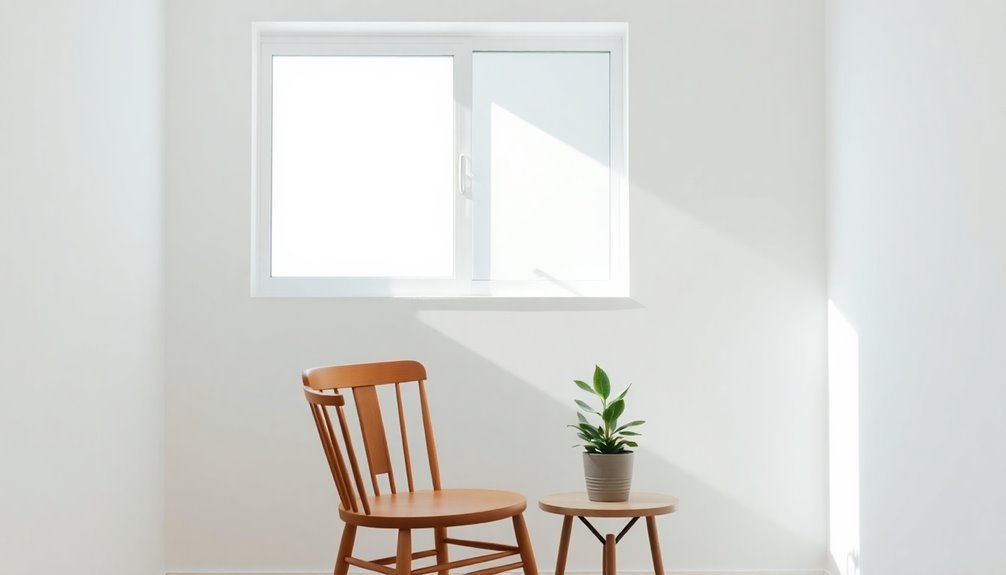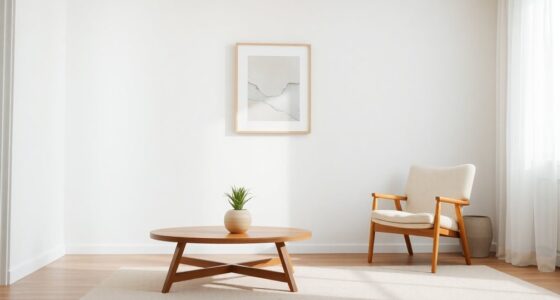The philosophy of minimalism encourages you to embrace simplicity by prioritizing what truly matters in your life. By focusing on experiences and relationships rather than material possessions, you can find joy in the concept of "less is more." This lifestyle helps reduce clutter, lower stress, and promote intentional living. When you assess the true value of your belongings, it leads to deeper connections and improved financial health. Discover how this mindset can redefine your daily existence.
Key Takeaways
- Minimalism emphasizes reducing possessions and distractions to focus on what truly matters in life, fostering meaningful experiences and relationships.
- The philosophy advocates for intentional living, prioritizing emotional well-being and mental clarity over material accumulation.
- By practicing mindful consumption, individuals can enhance their financial health, saving significantly by avoiding unnecessary purchases.
- Minimalism encourages a mindset shift from consumerism to valuing simplicity, promoting deeper satisfaction through enriching life experiences.
- Regular decluttering and assessing belongings help maintain a purposeful environment, reinforcing the concept that less truly is more.
Understanding Minimalism: A Definition

When you think about minimalism, it's more than just decluttering your space; it's a lifestyle that focuses on eliminating unnecessary possessions and distractions. This intentionality drives you to prioritize experiences, relationships, and personal growth rather than material accumulation.
Minimalism encourages you to assess the value and utility of items before acquiring them, helping you reduce clutter and gain clarity in your daily life. Rooted in historical philosophies, like those of Diogenes, minimalism advocates for simplicity and valuing essential needs over excess. Embracing minimalism can lead to the beauty of less is more, allowing you to find joy in simplicity and focus on what truly matters.
The Benefits of Embracing Minimalism

Embracing minimalism brings a host of benefits that can transform your life.
Adopting a minimalist lifestyle helps reduce stress, as a clutter-free environment lowers anxiety and boosts mental health. You'll start to focus on what truly matters, prioritizing experiences and relationships over material possessions, which leads to greater happiness and life satisfaction.
By practicing mindful consumption, you become more aware of essential versus non-essential purchases, potentially saving thousands annually. This shift to quality over quantity enhances your productivity and focus, allowing for clearer thinking in daily tasks. Moreover, setting boundaries between work and personal life can further enhance your overall well-being.
Ultimately, embracing minimalism not only improves your overall well-being but also frees up time and energy to invest in meaningful activities and connections that enrich your life.
Practical Applications of Minimalism in Daily Life

To embrace minimalism in your daily life, start by decluttering your space and removing items that don't serve a purpose or bring you joy. Implement mindful consumption practices, like the "one-in, one-out" rule, to keep your possessions in check. Regularly assessing and rotating items can help prevent clutter buildup and maintain a tidy environment.
Decluttering Your Space
Decluttering your space not only creates a more organized environment but also boosts your mental clarity and focus.
By systematically removing everything that distracts us, you create a serene atmosphere that enhances your overall well-being.
Embrace minimalist living by evaluating your belongings and keeping only the items that truly matter to you. This process not only promotes a sense of control but also fosters a feeling of accomplishment.
Adopting a "one in, one out" rule helps maintain your newfound balance, ensuring clutter doesn't creep back in.
Living with intentionality allows you to streamline your daily routines, reduce decision fatigue, and cultivate a lifestyle centered around what genuinely brings you joy and purpose. Additionally, applying functional layout principles can help you optimize your space further, ensuring that every item has a designated place and purpose.
Mindful Consumption Practices
While you navigate daily life, practicing mindful consumption can greatly impact your well-being and financial health. By critically evaluating your needs versus wants, you can make intentional purchases that align with your personal values. Implementing strategies like the "one-in, one-out" rule helps with decluttering and prioritizing what truly matters. Additionally, embracing a flexitarian diet can promote both health and sustainability, reinforcing the principles of minimalism in your food choices.
Here's a quick reference to enhance your mindful consumption practices:
| Practice | Description |
|---|---|
| Evaluate Needs vs. Wants | Determine what you truly need before buying. |
| Intentional Purchases | Only buy items that resonate with your values. |
| One-In, One-Out | For every new item, let go of an old one. |
| Set Budgets | Limit spending in categories to avoid overspending. |
| Embrace Digital Minimalism | Curate online spaces to reduce distractions. |
Embrace these practices to foster a more intentional lifestyle.
Minimalism and Financial Well-being

Minimalism can greatly boost your financial well-being by helping you save through conscious spending.
By focusing on essential purchases, you'll reduce financial stress and make more informed decisions about your money.
Embracing this lifestyle allows you to prioritize what truly matters, leading to a more satisfying and stable financial future.
Savings Through Conscious Spending
When you embrace the principles of minimalism, you naturally start evaluating your purchases based on their true value and utility. This shift leads to significant savings by reducing unnecessary expenses.
By practicing conscious spending, you make intentional financial decisions that prioritize experiences over material possessions. Research shows that many minimalists report saving 20-30% monthly by cutting out non-essential purchases.
You'll find that valuing quality over quantity results in longer-lasting items, ultimately saving you money through reduced replacement costs.
Embracing minimalism helps you avoid impulse buying, which can account for up to 40% of consumer spending. As you focus on meaningful investments, you enhance your overall financial well-being while enjoying a simpler, more fulfilling life. Additionally, adopting a minimalist mindset can complement your efforts in creating a retirement savings plan, ensuring that your financial goals align with your values.
Reducing Financial Stress
By simplifying your life and prioritizing what truly matters, you can greatly reduce financial stress. Embracing minimalism as a lifestyle helps you distinguish between needs and wants, empowering you to budget effectively and save money.
When you focus on quality over quantity, you often invest in durable goods that last longer, leading to fewer replacements and overall savings. Decluttering your space can also ease anxiety, as owning fewer possessions means less time spent managing and maintaining items.
Redirecting funds from unnecessary purchases towards meaningful experiences or savings enhances your financial well-being. Ultimately, minimalism encourages mindfulness in your financial habits, promoting a healthier relationship with money and reducing financial stress in your life. Additionally, adopting sustainable habits allows you to make purchases that align with your values, further supporting your financial goals.
Value of Essential Purchases
Focusing on what truly matters not only alleviates financial stress but also highlights the value of essential purchases.
By adopting minimalism, you'll reduce unnecessary purchases and channel your resources toward essential items that genuinely enhance your life. This shift improves your financial health and fosters a mindful approach to spending.
Research shows that most clutter consists of rarely used decorative items, emphasizing the need to differentiate between essential and non-essential purchases.
Prioritizing meaningful purchases allows you to invest in quality over quantity, ensuring you select durable items that last. Additionally, understanding Roth vs. Traditional IRA options can further guide your financial decisions, allowing you to allocate funds more effectively for long-term benefits.
Ultimately, this strategy not only saves money but also cultivates a healthier relationship with your finances, freeing you from the burdens of debt and financial instability.
Minimalism's Impact on Mental and Emotional Health

Minimalism significantly impacts mental and emotional health, especially as it helps eliminate the chaos of physical clutter that often weighs you down.
By embracing this lifestyle, you can experience:
- Reduced Stress: A cleaner space leads to a more serene environment, lowering anxiety levels and enhancing your mental health.
- Enhanced Mindfulness: Engaging in minimalism encourages intentional living, fostering greater emotional well-being and satisfaction in life.
- Deeper Connections: Focusing on meaningful relationships over material possessions enhances social support, essential for your mental health.
As you reduce distractions, you'll find clearer thinking and improved decision-making, allowing you to concentrate on what truly matters in your life. Additionally, adopting minimalism can serve as a catalyst for emotional resilience, helping you cope more effectively with life's challenges.
Minimalism isn't just about less; it's about a richer, more fulfilling existence.
Minimalism in a Consumer-driven Society

In a world where consumerism reigns, it's easy to get caught up in the idea that more possessions equal more happiness. However, minimalism challenges this notion by promoting intentional living and mindful consumption. Research shows that individuals embracing minimalism often report increased life satisfaction and reduced stress levels. Instead of accumulating items, focus on enriching experiences and nurturing relationships. By adopting a growth mindset, you can shift your perspective on what truly brings fulfillment in life.
| Aspect | Consumerism | Minimalism |
|---|---|---|
| Focus | Accumulation of possessions | Intentional living |
| Impact on happiness | Temporary satisfaction | Lasting fulfillment |
| Stress levels | Higher due to clutter | Lower through simplicity |
| Life satisfaction | Often diminished | Typically increased |
| Awareness | Low, driven by marketing | Growing through movements |
Frequently Asked Questions
What Is the Life Philosophy of Minimalism?
Minimalism's life philosophy revolves around simplifying your life by focusing on what truly matters.
It encourages you to prioritize essential possessions and experiences, reducing clutter and distractions.
By reflecting on your values, you can align your choices with your goals, fostering deeper connections and personal growth.
Embracing minimalism can lead to reduced stress and greater fulfillment, as you learn to appreciate quality over quantity in every aspect of your life.
Why Less Is More Minimalism?
Imagine a life cluttered with possessions versus one that's simple and serene.
You'll find that less is more when you focus on what truly matters. By letting go of excess, you create space for joy, clarity, and connection.
It's not just about physical items; it's about freeing your mind from distractions. Embracing minimalism helps you prioritize relationships and passions, leading to a richer, more fulfilling existence while reducing stress and anxiety.
What Is the Philosophy of Less Is More?
The philosophy of "less is more" suggests that simplicity enhances your life.
By focusing on what truly matters, you can eliminate distractions and appreciate the essential aspects of your existence.
This approach encourages you to reflect on your values and make intentional choices, leading to clearer priorities and greater satisfaction.
Instead of accumulating possessions, you'll find joy in meaningful experiences and relationships, ultimately creating a more fulfilling and purposeful life.
What Are Some Quotes From the Philosophy of Minimalism?
You know, they say "less is more," but have you ever tried fitting your entire life into a shoebox?
It's a miracle! Mies van der Rohe championed this idea, while Thoreau yelled "simplicity!" louder than your neighbor's lawn mower.
Kondo's all about tossing stuff that doesn't spark joy—goodbye, old socks!
Da Vinci called simplicity sophisticated, and Morris? He'd make you question your entire collection of plastic flamingos.
Embrace the chaos, but maybe not that much!
Conclusion
In a world that often feels cluttered, embracing minimalism can help you cut through the noise and focus on what truly matters. By simplifying your surroundings and priorities, you not only enhance your well-being but also pave the way for financial freedom. Remember, when you learn to let go of excess, you open the door to a more fulfilling life. So, why not take the plunge and see how less can indeed be more for you?









